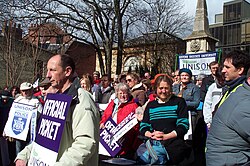Law
Much like corporations, [5] trade unions were regarded as criminal until the Combination Act 1825, and were regarded as quasi-legal organisations, subjected to the restraint of trade doctrine, until the Trade Union Act 1871. This Act abolished common-law restrictions, but took an abstentionist stance to unions' internal affairs. The Trade Disputes Act 1906 exempted trade-union funds from liability in action for damages for torts, and this freedom gave future union pickets a great deal of power.
Democratic organisation

The principle that the common law enforced a union's own rules, and that unions were free to arrange their affairs, is reflected in the ILO Freedom of Association Convention and in Article 11 of the European Convention on Human Rights, subject to the requirement that regulations "necessary in a democratic society" may be imposed. Unions must have an executive body and that executive must, under the Trade Union and Labour Relations (Consolidation) Act 1992 sections 46 to 56, be elected at least every five years, directly in a secret, equal postal vote of union members.
Union constitutions
The structure of the unions was based in contract, and the rights of members depended on being able to show some proprietary interest to be specifically enforced. [7] This meant that the express terms of the union rule book can, like any contract, be supplemented with implied terms by the courts as strictly necessary to reflect the reasonable expectations of the parties, [8] for instance, by implying the Electoral Reform Service's guidance to say what happens in a tie break situation during an election when the union rules are silent. [9] If there are irregular occurrences in the affairs of the union, for instance if negligence or mismanagement is not alleged and a majority could vote on the issue to forgive them, then members have no individual rights to contest executive decision making. [10] However, if a union's leadership acts ultra vires , beyond its powers set out in the union constitution, if the alleged wrongdoers are in control, if a special supra-majority procedure is flouted, or a member's personal right is broken, the members may bring a derivative claim in court to sue or restrain the executive members. So in Edwards v Halliwell [11] a decision of the executive committee of the National Union of Vehicle Builders to increase membership fees, which were set in the constitution and required a two-thirds majority vote, was able to be restrained by a claim from individual members because this touched both a personal right under the constitution and flouted a special procedure.
Discipline and expulsion
- ASLEF v United Kingdom [2007] ECHR 184
- McVitae v UNISON [1996] IRLR 33
- Roebuck v NUM (Yorkshire Area) No 2 [1978] ICR 676, Templeman J
- Esterman v NALGO [1974] ICR 625, Templeman J
- Radford v NATSOPA [1972] ICR 484, Plowman J
Dispute resolution
- Hamlet v GMBATU [1987] ICR 150, Harman J
- Longley v NUJ [1987] IRLR 109
Union members' rights
- Trade Union and Labour Relations (Consolidation) Act 1992 ss 28–31, true and fair view of accounts, member's right to inspect, and complaints to Certification Officer.
- Trade Union and Labour Relations (Consolidation) Act 1992 ss 62–65, right to require a ballot before industrial action, and no detriment may follow
- Knowles v Fire Brigades Union [1997] ICR 595
- Edwards v Society of Graphical and Allied Trades [1971] Ch 354
- Cheall v APEX [1983] 2 AC 180
- Trade Union and Labour Relations (Consolidation) Act 1992 s 174
- ASLEF v United Kingdom [2007] ECHR 184
- Amalgamated Society of Railway Servants v Osborne [1910] AC 87, political donations
- Trade Union Act 1913
- Birch v National Union of Railwaymen [1950] Ch 602
- Trade Union and Labour Relations (Consolidation) Act 1992 s 72–73 and 82
- Paul v NALGO [1987] IRLR 413
- Weaver v NATFHE [1988] ICR 599 EAT
Subscriptions
Members' subscriptions are often paid by DOCAS (Deduction of Contributions at Source) i.e. deduction from salary. Implementation of the draft Trade Union (Deduction of Union Subscriptions from Wages in the Public Sector) Regulations 2017 has been delayed until 2019. [12]
